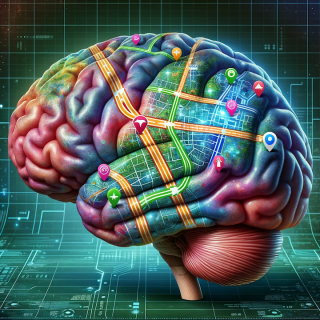Artificial Intelligence
LLMs Are Today's GPS for Thought
Like GPS, cognitive navigation will become ubiquitous.
Posted December 13, 2023 Reviewed by Monica Vilhauer Ph.D.
Key points
- LLMs, akin to GPS in travel, drive intellectual exploration with precision, efficiency, and engagement.
- GPS frames a physical journey, while LLMs foster intellectual growth and empowerment.
- LLMs guide knowledge acquisition, but unstructured creative thought remains essential.

Let's go on a trip. One of the first steps is to punch in your destination into a GPS system like Waze. The rest is easy and even fun. But beyond simple travel, every day we take many cognitive journeys. And the evolving navigation for these trips is coming to life via AI and LLMs.
Large Language Models (LLMs) such as ChatGPT, Gemini and Grok have emerged as pivotal tools in the cognitive domain. Much like the Global Positioning System (GPS) revolutionized physical navigation, LLMs are transforming the way we traverse intellectual landscapes. This comparison unveils fascinating insights into how these technologies are not just tools but enablers of a higher order of human endeavor.
The GPS of Thought
GPS, a now-ubiquitous technology, offers accurate, up-to-date directions, helping us avoid traffic jams and find the most efficient routes. Similarly, LLMs like GPT provide intellectual navigation, guiding us through vast information landscapes with accuracy and speed. They help filter the noise, drawing our attention to what is most relevant, much like GPS directs us to the fastest route, avoiding unnecessary detours.
Accuracy, Speed, and Enjoyment
The first point of convergence between LLMs and GPS is in their core offerings: accuracy, speed, and enjoyment. Just as GPS provides accurate and timely directions, LLMs offer precise information and insights, often sifting through mountains of data faster than any human could. This speed in obtaining relevant information is akin to the quick recalculations of a GPS when a wrong turn is taken. Furthermore, both technologies add an element of enjoyment to their respective journeys. GPS allows for a more relaxed driving experience, while LLMs can transform a daunting research task into an engaging exploration.
Cognitive Freedom and the Intellectual Journey
LLMs offer a unique opportunity to navigate our cognitive processes, optimizing the intellectual journey. They can reveal unexpected paths and uncharted territories in thought, much as a scenic detour recommended by a GPS can lead to delightful discoveries. This aspect of LLMs speaks to the human spirit of exploration and the joy of learning, highlighting how these models are not just functional tools but catalysts for intellectual adventure.
Empowerment and the Hierarchy of Needs
Drawing from Maslow's hierarchy of needs, both GPS and LLMs provide a level of empowerment that may resonate deeply with human aspirations. GPS technology addresses our need for safety and security in navigation. In parallel, LLMs like GPT satisfy our intellectual needs, providing a foundation for cognitive perspective in the information age. They empower users by enhancing their ability to understand, analyze, and create, fulfilling the human desire for empowerment and perhaps even self-actualization through knowledge.
The Unmapped Human Journey
Despite the parallels, it's crucial to recognize the unique aspects of the human journey that remain beyond the realm of technology. Sometimes, the most memorable experiences come from turning off the GPS and exploring without a map. Similarly, in the cognitive realm, there's a distinct pleasure in unguided thought, where creativity and imagination roam free without the guiding hand of an LLM. This unstructured exploration is vital for human creativity and innovation, serving as a reminder that technology is an aid, not a substitute for the richness of the human mind. And sometimes, a less traveled path is worth taking.
Navigating Life with AI and LLMs
In the broader context, AI and LLMs are not just tools for navigating specific tasks or queries; they are becoming integral to navigating life itself. They assist in decision-making, learning, and even understanding complex emotions and social dynamics. They provide accuracy, speed, and enjoyment in intellectual endeavors, empowering users in their pursuit of knowledge and creativity. However, just as with GPS, there is value in sometimes turning off the guidance to explore freely. In the end, the most profound journeys are those where technology and human intuition blend seamlessly, each enhancing the other in the pursuit of discovery and understanding.
In this cognitive age, as we harness the power of LLMs, it's vital to remember that our human journey is as much about the unexpected paths as it is about the efficiently charted courses. AI and LLMs are our companions in this journey, helping us navigate the complexities of life while reminding us to cherish the unguided adventures that make us inherently human and offer the discover of the unexpected.


